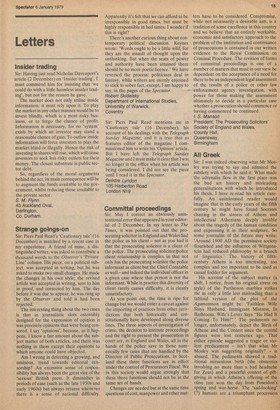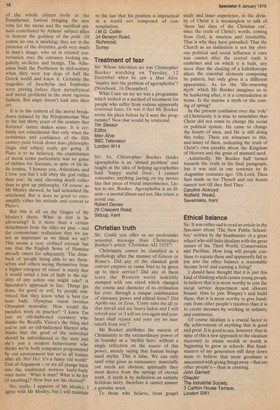All Greek
Sir: I was indeed observing what Mr Mosley was trying to say and admired the subtlety with which he said it. What made the adrenalin flow in the first place was the bad art history and misleading generalisations with which he introduced his thesis. I have re-read his article carefully. An uninformed reader would imagine that in the early years of the fifth century he might have found Socrates chatting in the streets of Athens and intellectual Athenians deeply trouble about the tragedy of the human condition and expressing it in their sculpture. So some journalist of the future may write: 'Around 1900 AD the permissive society flourished and the influence of Wittgenstein had reduced philosophy to a branch of linguistics.' The history of fifthcentury Athens is too interesting, too complex and too important to be used as casual fodder for argument.
His account of the subject matter (a shift, I notice, from his original stress on style) of the Parthenon marbles strikes me as only a little less misleading than a tabloid version of the plot of the Agamemnon might be: 'Faithless Wife Slays Husband, Immigrant Mistress, In Bathroom. Wife's Lover Says "He Had It Coming To Him!"' The pediments no longer, unfortunately, depict the Birth of Athene and the Contest since the central figures were lost centuries ago. That either episode suggested a tragic or violent predicament — isn't that what Mr Mosley was suggesting originally? — is absurd. The pediments showed a traditional miraculous birth (the obstetrics involving no more than a bad headache for Zeus) and a peaceful contest of giftgiving in which Athene's offering of the olive tree won the day from Poseidon's spring and war-horse. The 'sad-looking' (?) humans are a triumphant procession of the whole citizen body at the Panathenaic festival bringing the new robe. for the statue and the sacrifical animals contributed by Athens' subject allies to honour the goddess of the polls. Of course no one is smirking; they are in the presence of the divinities, gods very much in man's image, who sit in relaxed conversation over the entrance looking singularly un-fierce and benign. The Athenians built the Parthenon in mid-century when they were top dogs of half the Greek world and knew it. Certainly the tragedies of Aeschylus and Sophocles were putting before them metaphysical and moral problems in the most rigorous fashion. But angst doesn't leak into their art.
It is in the context of the moral breakdown induced by the Peloponnesian War in the last thirty years of the century that Socrates' career makes sense. It is certainly not coincidental that only when the certainties and confidence of the fifth century polis break down does philosophy (logic and ethics) really get going. If Plato is to be believed, the examination of moral terms particularly was no game of skittles for Socrates, in spite of his little ironies, 'I honour you, Athenians, and I love you but I will obey the god rather than you', he said, choosing death rather than to give up philosophy. Of course, as Mr Mosley showed, he had unleashed the whirlwind. But it does no good to oversimplify either his attitude and context or Plato's.
But this is all on the fringes of Mr Mosley's thesis. What in fact is he advocating? Is it more than a certain detachment from the roles we play — and the concomitant realisation that we are not as important as we think we are? This seems a very civilised attitude but one that the English Sense of Humour already caters for adequately. The drawback of 'people being able to see themselves and others seeing themselves from a higher category of vision' is surely that it would entail a loss of faith in the validity of any action one might take? A Spectator's approach in fact. Things get done, for good or evil, by people convinced that they know what is best (or least bad). Olympian vision involves Olympian neutrality. How would the paradox work in practice? 'I know I'm just an old-fashioned visionary who thinks the Beatific Vision's the thing and you're just an old-fashioned Marxist who thinks that the good of the individual should be subordinated to the state and she's just a modern behaviourist who thinks we're both computers programmed by our environment but we're all human after all. Ho! Ho! It's a funny old world!' End of Argument — or we all plunge back into the traditional western hurly-burly once more: 'What is man? What is he for (if anything)? How free are his choices?'
No, really, I approve of Mr Mosley, I agree with Mr Mosley, but I will maintain to the last that his position is impractical in a world not composed of con templatives.
Collier 34 Berwyn Road, Richmond, Surrey































 Previous page
Previous page